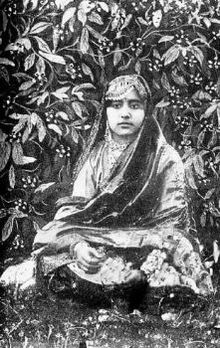Malika Pukhraj
This article needs additional citations for verification. (February 2015) |
Malika Pukhraj | |
|---|---|
 Malika Pukhraj in 1920s in Kashmir | |
| Background information | |
| Born | 1912 Jammu, Kashmir and Jammu, British India |
| Died | 2004 (aged 92) Lahore, Punjab, Pakistan |
| Genres | Folk music and Ghazal |
| Occupation(s) | Vocalist |
Malika Pukhraj (Urdu: ملكہ پکھراج) (b1912 - 2004) was a highly popular Ghazal and folk singer of Pakistan. She was generally called as "Malika" meaning "The Queen." She is extremely popular for her rendition of Hafeez Jalandhri's song, Abhi to main jawan hoon ("I am still youthful"), which is enjoyed by millions not only in Pakistan, but also in India.[1] Her popular numbers were,Lo phir basant aaya and Quli Qutub's Piya baaj piyale piya jaye na and Faiz Ahmed Faiz's Mere qatil mere dildar mere paas raho.
Early life
Malika Pukhraj, was born in Mirpur, on the banks of the River Chenab, 16 miles from Jammu Punjab region, British India, in a Kanjar family of traditional singers.[2] As she grew up her mother moved to a Kotha(brothel) in Rajinder Bazar, Kanak Mandi area of Jammu, where she spent early years of her life. She was given the name "Malika" at birth, by 'Majzoob', Baba Roti Ram, a spiritualist, in Akhnoor area,[3] and named Pukhraj by her Aunt [2]
Malika Pukhraj received her training from Ustad Ali Baksh Kasuri, father of legendary singer Ustad Bade Ghulam Ali Khan.
Performing career
At nine she visited Jammu and performed at the coronation ceremony of Maharaja Hari Singh, who was so impressed by her voice that he appointed her as a court singer in his Durbar,[4] and she stayed there for another nine years.[2]
She was among the greatest singers of British India in the 1940s, and after Partition of India in 1947, she migrated to Lahore, Pakistan,[5] where she received further fame, through her radio performances with composer, Kale Khan.[6]
In 1980, she received the Presidential Pride of Performance Award, Pakistan.[7] In 1977, when All India Radio, for which she sang until Partition, was celebrating its Golden Jubilee, she was invited to India, and awarded with the 'legend of Voice' award.[8] Malika Pukhraj also recorded her memoirs in the novel Song Sung True.
Malika Pukhraj, died in Lahore on February 4, 2004.[6] Her funeral procession started from her residence West Canal bank, and she was buried at 'Shah Jamal' graveyard in Lahore.[7]
Personal life
Malika Pukhraj was married to Shabbir Hussain Shah[citation needed], a junior government official in the Punjab[citation needed] and had six children[citation needed], including Tahira Syed, also a singer[citation needed].
References
- ^ .Abhi to main jawan hoon
- ^ a b c Biography
- ^ Malika Pukhraj’s memory still ‘jawan’ in Jammu The Tribune, February 8, 2004.
- ^ Unparalleled queen of gayaki The Hindu, June 4, 2004.
- ^ Obituary -2004 - मलिका पुखराज BBC Hindi.
- ^ a b Pakistani folk music doyenne dies BBC News, February 4, 2004.
- ^ a b Renowned Classical Singer Malika Pukhraj Pakistan Times.
- ^ Malika takes a final bow Dawn, February 15, 2004.
